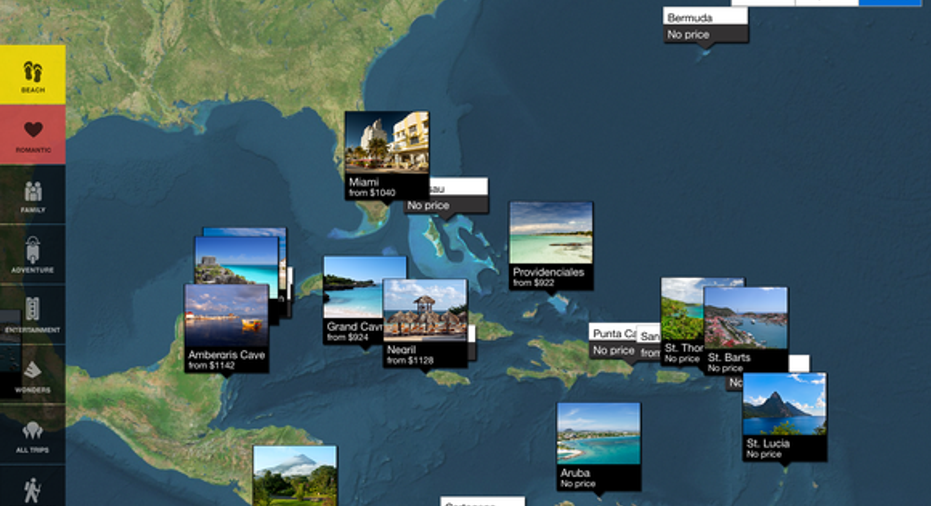Better Buy Now: Priceline vs. Expedia

Consumers around the world are increasingly relying on online platforms and mobile apps to purchase all kinds of products and services. The travel industry is no exception, as new technologies are dramatically changing the way we search for information and make travel reservations. Let's look at two key players in this attractive business, Priceline Group and Expedia , to find out which one is a better purchase for investors right now.
Size matters in the online travel industry
The network effect is a major source of competitive advantage in the business. Airlines and hotel operators want to go with the platforms offering lots of potential customers, and travelers are naturally attracted to the companies offering more and better deals. A bigger platform provides a more valuable service to both travelers and companies in the industry, so size is a key factor to keep in mind.
Image Source: Priceline
Priceline is expected to make $10.66 billion in revenue during 2016, while Wall Street analysts are expecting $8.91 billion in sales from Expedia over the same period. As for the size of the platform, Priceline's main brand, Booking.com, ended the first quarter of 2016 with nearly 900,000 hotels and other accommodations in over 220 countries, up 31% versus the same quarter in 2015. By comparison, Expedia has 282,000 properties available on its websites as of the end of the first quarter, a 23% annual increase.
Priceline has an advantage versus Expedia in terms of size, and the company also offers a much larger international presence. Priceline made $2 billion in gross profit last quarter, and nearly 85% of that money came from international markets. As for Expedia, the international segment produced a much more modest 35% of gross bookings last quarter.
Many international currencies are depreciating against the U.S. dollar, hurting Priceline's financial performance when translating revenue in different currencies to dollars. However, international markets are moreunder-penetrated compared to the U.S. in online travel services, so a wide global presence alsomeans superior growth opportunities for Priceline over the long term.
Image Source: Getty.
Business models and profitability
There are basically two kinds of business models for companies in this sector. Under the agency model, online travel agencies simply act as intermediaries between travelers and industry operators. Hotels and other operators list their own prices on the platform, and the online travel agency makes a commission on every transaction. In the merchant business model, online travel agencies purchase hotel inventory and then resell it to travelers on their own terms.
Priceline operates mostly under the agency model. The company made 93% of its gross bookings from this segment last quarter, so it doesn't need to worry about variables such as inventory risk, and the business model is spectacularly profitable. Priceline retains operating margins above 35% of revenue on an annual basis.
Expedia's business model is more balanced, with 56% and 44% of gross bookings coming from agency and merchant operations, respectively. This allows the company to have more control over prices and overall supply across its websites, but profit margins are also significantly lower. Trailing-12-month operating margin for Expedia is around 5% of revenue.
By the numbers
Both Priceline and Expedia have made big acquisitions over the past several years. That's a good thing for investors in the industry, as it provides scale and pricing power. Nevertheless, evaluating organic performance can be more complicated when companies are regularly buying other businesses. That said, both Priceline and Expedia have delivered impressive revenue growth over the last five years, while Priceline placed moderately ahead of its rival.
PCLN Revenue (TTM) data by YCharts.
As for valuation ratios, Priceline stock trades at a price-to-earnings ratio in the area of 25.8, while Expedia comes in around 24.2. Considering Priceline has superior profitability and has delivered higher growth over the past several years, this modest premium for Priceline over Expedia doesn't look excessive at all.
If international currencies remain weak against the U.S dollar, then Expedia stock could deliver better performance than Priceline over the coming quarters. On the other hand, when considering international growth prospects and profitability, Priceline looks like the best pick for investors with an investment horizon of three years or more.
The article Better Buy Now: Priceline vs. Expedia originally appeared on Fool.com.
Andrs Cardenal owns shares of Priceline Group. The Motley Fool owns shares of and recommends Priceline Group. Try any of our Foolish newsletter services free for 30 days. We Fools may not all hold the same opinions, but we all believe that considering a diverse range of insights makes us better investors. The Motley Fool has a disclosure policy.
Copyright 1995 - 2016 The Motley Fool, LLC. All rights reserved. The Motley Fool has a disclosure policy.



















